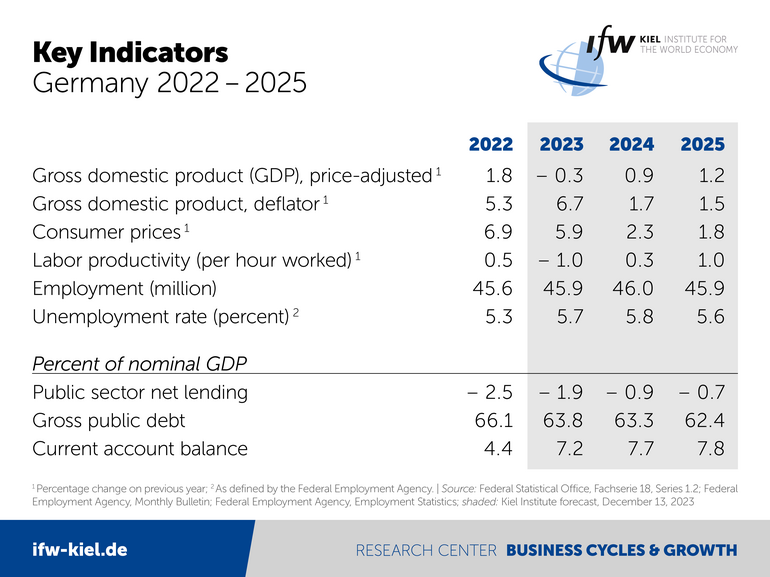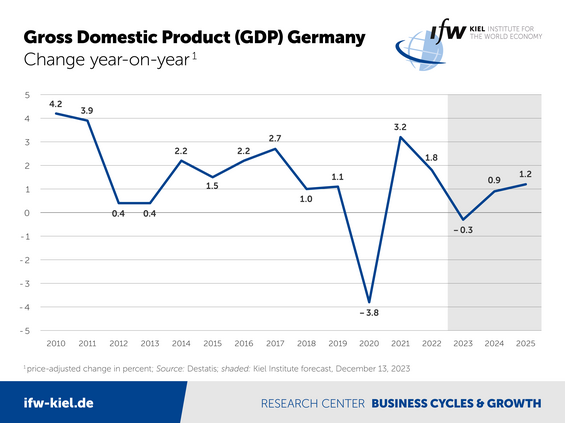News
Budget consolidation weighs on economic outlook, inflation falls significantly

Based on the Kiel Institute's assumptions regarding budget consolidation, the federal budget in 2024 and 2025 will be reduced by around EUR 30 billion in both years, which will reduce the growth rate for gross domestic product (GDP) by some estimated 0.3 percentage points in 2024. Economic output is expected to increase by 0.9 percent (autumn forecast: 1.3 percent). For 2025, the Kiel Institute currently forecasts growth of 1.2 percent (previously 1.5 percent).
Given the pending budgetary response, the outlook is more uncertain than usual. While a recession is unlikely in 2024, it cannot be ruled out if all downward risks materialize.
"Following the ruling from Karlsruhe, Germany lacks a final national budget for 2024 because the federal government had no plan B for this. As a result, coalition negotiations are now pending again in important areas of economic and fiscal policy. Consolidation and uncertainty about the outcome not only affect our economic outlook, but also weigh on economic activity. As a result, investment attentiveness is increasing even further," said Stefan Kooths, Head of Business Cycle and Growth Research at the Kiel Institute for the World Economy (IfW Kiel), on the occasion of the winter forecasts for Germany and the global economy published today.
Overall, economic momentum in Germany is subdued and the economy is struggling to break out of stagnation. However, private consumption is providing support and is likely to increase by around 1.5 percent in each of the next two years. This is due to strong growth in real disposable income, primarily as a result of higher wages in combination with falling inflation.
High financing costs will continue to weigh on the construction industry well into next year. Construction investment is likely to fall significantly this year (-1.6 percent) and next year (-2.5 percent).
Geopolitics: China's economy loses momentum
Stimulus from external demand is missing for the time being. The world economy is likely to continue to grow only moderately by around 3 percent in the next two years. The US will manage a soft landing in the new interest rate environment avoiding recession. Growth rates are forecast at 2.4 percent (2023), 1.5 percent (2024) and 2.0 percent (2025).
China's economy is set to lose momentum, not least due to Beijing's geopolitical goal of reducing dependency on the West. According to the forecast, growth will slow down to 4.7 percent and 4.6 percent, respectively, in the coming two years, following 5.4 percent in 2023. The downside risks have also increased here.
"Following the bursting of the real estate bubble, China is experiencing a structural growth crisis with a declining working population and rising unemployment. Geopolitical tensions are increasing and pose a significant risk to the global economy. The US and China are not only fighting over trade issues, but also over supremacy in the Pacific. Differences between the EU and China have also increased recently. The re-election of US President Donald Trump in 2024 would probably act as an accelerant here," said Moritz Schularick, President of the Kiel Institute.
German exports are likely to fall by 1.4 percent this year, stagnate in 2024 and increase more significantly again not before 2025. Germany's current account surplus will rise well above 7 percent again.
Inflation falls, unemployment rises
Over the next two years, inflation is likely to fall further to below the European Central Bank's (ECB) 2 percent target. Both energy prices and food prices will have a dampening effect on inflation.
Overall, annual inflation is likely to be 5.9 percent (2023), 2.3 percent (2024) and 1.8 percent (2025). The core rate (excluding energy) is around 0.5 percentage points higher. With a similar picture in the euro area, the ECB is likely to cut interest rates significantly next year.
The German labor market is showing signs of weakness. Employment growth came to a standstill in the summer, while the number of unemployed is increasing. According to the forecast, the unemployment rate will rise to 5.7 percent (2023) and 5.8 percent (2024) and then fall slightly to 5.6 percent (2025).
Government debt falls significantly in relation to economic output. Higher prices and wages will lead to rising tax revenues, while consolidation will dampen expenditures. The government's budget deficit is likely to decline from 1.9 percent of GDP (2023) to 0.7 percent (2025). The debt level will fall from 63.8 percent to 62.4 percent over the same period.
Despite budgetary consolidation, the general government deficits are expected to remain above the 0.35 percent mark in relation to GDP. However, the higher deficits are likely to be in line with the requirements of the debt brake.


